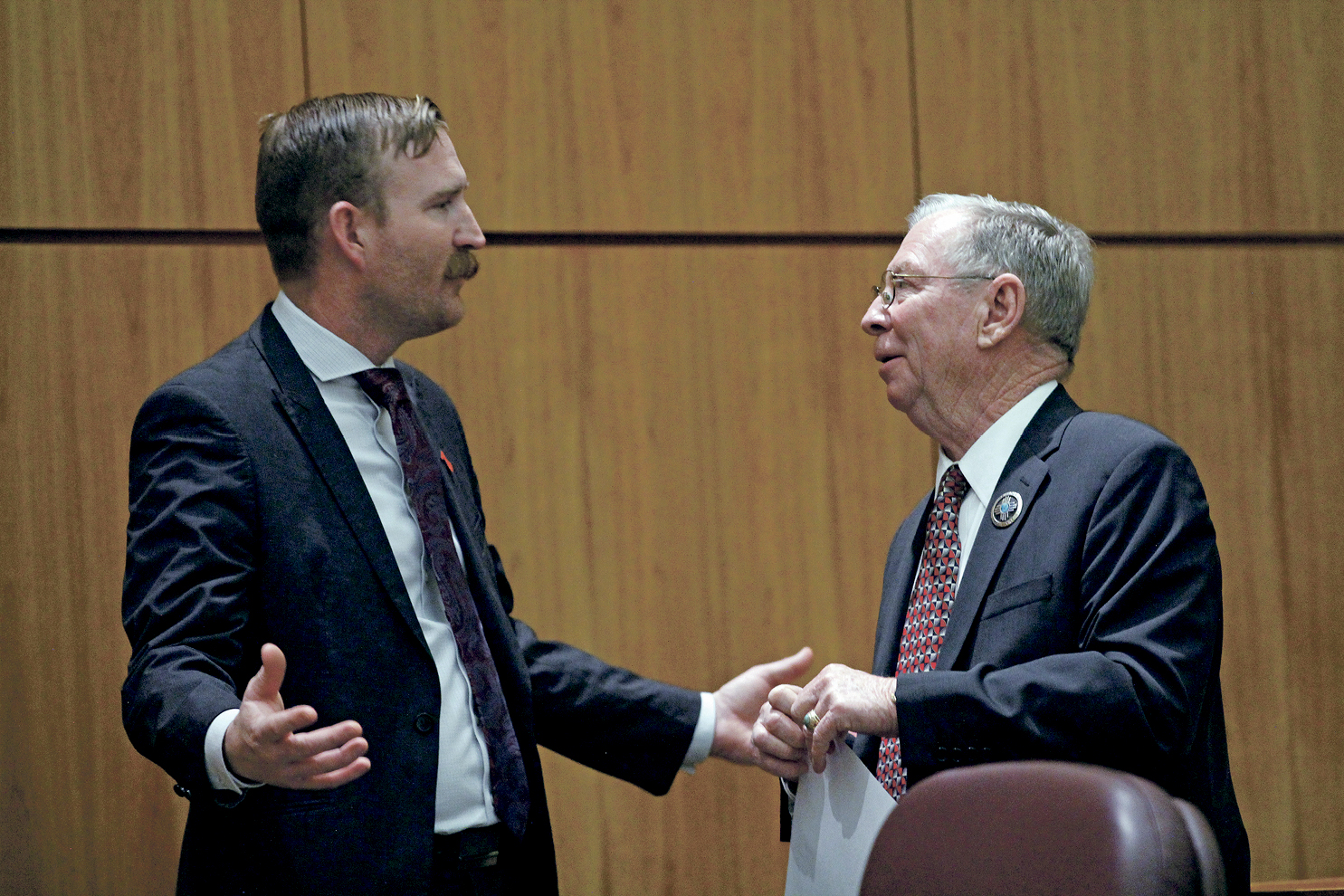
Luis Sánchez Saturno/The New Mexican
In this file photo, New Mexico senators Cliff R. Pirtle (left) and William H. Payne speak on the House floor.
SANTA FE, N.M. — A cursory look at the proposed laws sponsored by southeastern New Mexico lawmakers during the 2020 Legislature gives the impression that they only care about such items as road repair and recouping more oil and gas production revenue. But that’s not the case, according to Republican Sen. Cliff Pirtle, whose district includes Chaves, Eddy and Otero counties.
Pirtle is well aware that New Mexico labors to keep its kids safe and that the state continues its struggle to improve living conditions for at-risk youth. That’s why he was pleased that part of a new $7.6 billion budget will send more money to early childhood programs and child protective services.
“As a whole, I think we made a good step towards having a consistent funding source, which is crucial for programs that are necessary,” Pirtle said. “I think that’s the most important piece. We’ve added a level of security to the funding to ensure that these programs will be adequately funded every single year.”
Foster care and child welfare weren’t high priorities for Eddy and Lea County legislators during the 2020 session, which wrapped on Feb. 20 at the New Mexico State Capitol in Santa Fe. But Carlsbad children and families may be helped by a bill sponsored by an Eddy County legislator — a law that seems wholly unrelated to foster care and child welfare. Area lawmakers and foster parents are also making plans for foster youth in southeastern New Mexico.
An Occupancy Tax Could Help Kids
A frequent complaint from Eddy and Lea county residents is that the area is literally funding the state, but towns like Carlsbad and Hobbs aren’t securing any local financial benefits. The 2021 fiscal year budget that state lawmakers recently passed was injected with $797 million in new money from oil and gas production in the Permian Basin.
“Our area is an economic boom for the state right now, but we don’t see any of that money,” said Zelma Lopez, founder of Cavern City Child Advocacy Center in Carlsbad. “We have a lot of the negative stuff that comes with it. The roads are congested and we can’t afford housing. It causes stress on families.”
[Related: New Mexico Legislature Racks Up Successes, Losses, Compromises for Foster Youth]
[Related: Las Cruces, New Mexico, Legislator Helping Fight Childhood Trauma]
[Related: Fewer New Mexico Detention Centers Means Problems For Families, Staff]
[Related: N.M. Legislature Also Worked on Intersecting Foster Care Issues]
That could change with the Lodgers’ Tax Exemptions Act, or House Bill 117. The bill, sponsored by Republican Rep. Cathrynn Brown of Eddy County, modifies the allowable uses of lodgers’ taxes. (Brown, who also co-sponsored a House Memorial that urged federal officials to reduce the cliff effect and generational poverty, didn’t respond to an interview request.)
Previously, the tax revenue had to be used for tourism promotions or recruiting people to areas such as Carlsbad, says Denicia Cadena, director of legislative affairs for the Children, Families and Youth Department. Once the governor signs it into law, county commissioners and local officials can decide to appropriate the benefits of that tax elsewhere once someone rents a hotel room for 30 or more consecutive days, she said.
“People working in the man camps might stay in a hotel for six months,” Cadena said. “It absolutely wasn’t a CYFD bill, but I believe we’ll be able to see the benefits of that tax to possibly a broad range of social services and the needs of young people and families.”
Changes Down the Road
Pirtle believes that levying a higher gross receipts tax (GRT), which critics say is a convoluted and confusing substitute for traditional sales taxes, can direct more money to needy kids and adults. The GRT rate, which varies from 5.125% to 8.6875%, according to the New Mexico Taxation and Revenue Department, has been adjusted during past legislative sessions.
“You begin to see these extra funds and put them towards programs such as early childhood care and home visitation,” Pirtle said. “Also, by giving people gainful employment, and as property values go up, you’re able to get more revenue for your schools and create more educational opportunities.”
State officials need to ease the financial barriers for prospective foster parents, he said.
“I feel that New Mexico makes it too difficult for people to foster children. With our current system, it’s so expensive for a family to adopt a child permanently and become their legal guardian,” Pirtle said. “That’s something that we really need to study and look into. How do we make it easier and less expensive for people who want to adopt, especially kinship adoption?”
Cassie Kamplain, who has been a foster parent in Hobbs for close to a year, would certainly welcome additional overall support. Though she said she couldn’t be happier with her current CYFD case worker, she would definitely benefit from more resources. That’s why she and a fellow foster parent are in the early stages of assembling a foster care support and awareness group.
“I think having the community know more about the needs of foster parents and foster children, and that we need people to become foster parents because these children need people, is huge,” Kamplain said.
This story is part of a Youth Today project on foster care in New Mexico. It’s made possible in part by the May and Stanley Smith Charitable Trust. Youth Today is solely responsible for the content and maintains editorial independence.
























